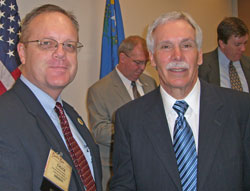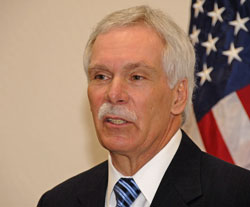 LifeLine Foods of St. Joseph, Missouri will join forces with the IndyCar® Series for the 2008 season as the official supplier of the 100 percent fuel-grade ethanol used in all IndyCar Series cars.
LifeLine Foods of St. Joseph, Missouri will join forces with the IndyCar® Series for the 2008 season as the official supplier of the 100 percent fuel-grade ethanol used in all IndyCar Series cars.
 LifeLine Foods is a unique company that uses corn to produce food and fuel. One portion of the kernel is processed and marketed to the food industry while the remainder of the corn kernel is used for, among other things, cattle feed and energy needs. Utilizing a bran energy recovery system, total plant energy needs will be reduced by approximately 50 percent. This method insures that the company is getting the most value out of corn, benefiting the agriculture, food and ethanol industries.
LifeLine Foods is a unique company that uses corn to produce food and fuel. One portion of the kernel is processed and marketed to the food industry while the remainder of the corn kernel is used for, among other things, cattle feed and energy needs. Utilizing a bran energy recovery system, total plant energy needs will be reduced by approximately 50 percent. This method insures that the company is getting the most value out of corn, benefiting the agriculture, food and ethanol industries.
 LifeLine was contracted by the Ethanol Promotion and Information Council (EPIC) to supply approximately 120,000 gallons of the fuel to the IndyCar Series. With the transition to an ethanol-blend in 2006 and then 100% fuel-grade ethanol in 2007, the IndyCar Series was the first motorsports league to require use of a renewable fuel.
LifeLine was contracted by the Ethanol Promotion and Information Council (EPIC) to supply approximately 120,000 gallons of the fuel to the IndyCar Series. With the transition to an ethanol-blend in 2006 and then 100% fuel-grade ethanol in 2007, the IndyCar Series was the first motorsports league to require use of a renewable fuel.


 The 2008 NEVC Executive Officers include: Chairman Bernie Punt,
The 2008 NEVC Executive Officers include: Chairman Bernie Punt,  Our Secretary of Agriculture, Ed Schafer, made his first major public policy speech today at the Cattle Industry Convention in Reno, NV. I had the pleasure of meeting him and talked someone into snapping a photo too. I thought you might be interested in hearing an audio clip from his speech here this morning since he hit the subject of high feed prices and renewable energy head on.
Our Secretary of Agriculture, Ed Schafer, made his first major public policy speech today at the Cattle Industry Convention in Reno, NV. I had the pleasure of meeting him and talked someone into snapping a photo too. I thought you might be interested in hearing an audio clip from his speech here this morning since he hit the subject of high feed prices and renewable energy head on. He says there’s no way we can get away from the reality of the need to become more energy independent here in America.
He says there’s no way we can get away from the reality of the need to become more energy independent here in America.  A Massachusetts biotechnology company has joined with a Missouri research firm to develop an oilseed that can produce both biodiesel and plastics.
A Massachusetts biotechnology company has joined with a Missouri research firm to develop an oilseed that can produce both biodiesel and plastics.  Probably the biggest issue facing biodiesel producers today is what to use as a feedstock. With soybean prices going through the roof, refiners are trying to find additional feedstocks. During the recent National Biodiesel Conference and Expo in Orlando, Florida, the last general morning session focused on the question of what to use for the green fuel.
Probably the biggest issue facing biodiesel producers today is what to use as a feedstock. With soybean prices going through the roof, refiners are trying to find additional feedstocks. During the recent National Biodiesel Conference and Expo in Orlando, Florida, the last general morning session focused on the question of what to use for the green fuel. Brown, who is Scottish, brought a European perspective and made the case for feedstocks made from non-traditional (at least in America) oilseeds, such as rapeseed. Bruinsma talked about how you can also get biodiesel from the same grain of corn used to make ethanol, while Soper talked about high oil corn and soybean seeds his company is developing. Sheehan, whose company makes biodiesel from algae, pointed out that they can get thousands of gallons for every acre of green pond scum they grow.
Brown, who is Scottish, brought a European perspective and made the case for feedstocks made from non-traditional (at least in America) oilseeds, such as rapeseed. Bruinsma talked about how you can also get biodiesel from the same grain of corn used to make ethanol, while Soper talked about high oil corn and soybean seeds his company is developing. Sheehan, whose company makes biodiesel from algae, pointed out that they can get thousands of gallons for every acre of green pond scum they grow. “Understanding the land use changes occurring around the globe is important to developing strategies to combat the advance of climate change. However, like previous studies, those published in Science today fail to put the issue in context. Assigning the blame for rainforest deforestation and grassland conversion to agriculture production solely to the renewable fuels industry ignores key factors that play a greater role. The continued growth of the global population, surging global demand for food from expanding middle classes in China and India, and continued expansion of development and urban sprawl are all factors contributing to the increased demand for arable acres.”
“Understanding the land use changes occurring around the globe is important to developing strategies to combat the advance of climate change. However, like previous studies, those published in Science today fail to put the issue in context. Assigning the blame for rainforest deforestation and grassland conversion to agriculture production solely to the renewable fuels industry ignores key factors that play a greater role. The continued growth of the global population, surging global demand for food from expanding middle classes in China and India, and continued expansion of development and urban sprawl are all factors contributing to the increased demand for arable acres.”  The science of ethanol can now be taught in the classroom in an informative and entertaining way with the
The science of ethanol can now be taught in the classroom in an informative and entertaining way with the 

 Last month, the young company made a splash at the North American international Auto Show in Detroit where a strategic partnership with General Motors was announced.
Last month, the young company made a splash at the North American international Auto Show in Detroit where a strategic partnership with General Motors was announced. According to Dave Vander Griend, president and CEO of ICM Coskata’s thermal biomass conversion process offers promising technology.
According to Dave Vander Griend, president and CEO of ICM Coskata’s thermal biomass conversion process offers promising technology.